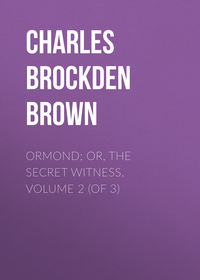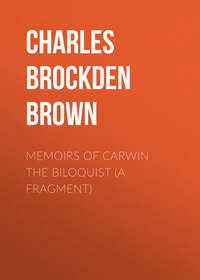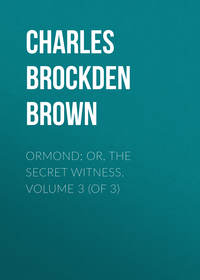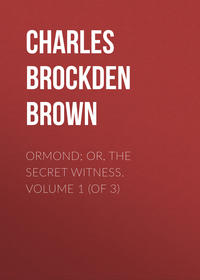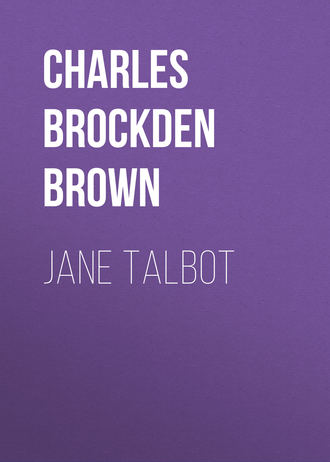 полная версия
полная версияJane Talbot
Every one has ways of his own. A transient glance at the post satisfies the mob of passengers. 'Tis my choice to stand a while and gaze.
The only post, indeed, which I closely examine, is myself, because my station is most convenient for inspecting that. Yet, though I have a fuller view of myself than any other can have of me, my imperfect sight--that is, my erring judgment–is continually blundering.
If all my knowledge relate to my own character, and that knowledge is egregiously defective, how profound must be my ignorance of others, and especially of her whom I presume to call mine!
No paradox ever puzzled me so much as your conduct. On my first interview with you I loved you; yet what kind of passion was that which knew only your features and the sound of your voice? Every successive interview has produced, not only something new or unexpected, but something in seeming contradiction to my previous knowledge.
"She will act," said I, "in such and such circumstances, as those of her delicate and indulgent education must always act. That wit, that eloquence, that knowledge, must only make her despise such a witless, unendowed, unaccomplished, wavering, and feeble wretch as I am."
To be called your friend; to be your occasional companion; to be a tolerated visitor, was more than I expected. When I found all this anxiously sought and eagerly accepted, I was lost in astonishment. At times–may I venture to confess?–your regard for me brought your judgment into question! It failed to inspire me with more respect for myself; and not to look at me with my own eyes degraded you in my opinion.
How have you laboured to bestow on me that inestimable gift,–self-confidence! And some success has attended your efforts. My deliverance from my chains is less desperate than once it was. I may judge of the future, perhaps, by the past. Since I have already made such progress in exchanging distant veneration for familiar tenderness, and in persuading myself that he must possess some merit whom a soul like thine idolizes, I may venture to anticipate the time when all my humiliation may vanish, and I shall come to be thought worthy of thy love, not only by thee, but by myself.
What a picture is this thou drawest! Yet such is my weakness, Jane, that I must shudder at the prospect. To tear thee from thy present dwelling and its comforts, to make thee a tenant of thy good widow, and a seamstress for me!
"Yet what" (thou sayest) "is a fine house, and a train of servants, music, and pictures? What silly prejudice, to connect dignity and happiness with high ceilings and damask canopies and golden superfluity!"
Yet so silly am I, when reason deserts the helm and habit assumes it. The change thou hast painted deceives me for a moment, or rather is rightly judged of while I look at nothing but thy colouring; but when I withdraw my eye from that, and the scene rises before me in the hues it is accustomed to derive from my own fancy, my soul droops, and I pray Heaven to avert such a destiny.
I tell thee all my follies, Jane. Art thou not my sweet physician? and how canst thou cure the malady when thou knowest not all its symptoms?
I love to regard myself in this light:–as one owing his virtue, his existence, his happiness, his every thing, to thee, and as proposing no end to himself but thy happiness in turn, but the discharge of an endless debt of gratitude.
On my account, Jane, I cannot bear you should lose any thing. It must not be. Yet what remedy? How is thy mother's aversion to be subdued? how can she be made to reason on my actions as you reason? Yet not so, either. None but she that loves me can make such constructions and allowances as you do.
Why may she not be induced to give up the hope of disuniting us, and, while she hates me, continue her affection for thee? Why rob thee of those bounties hitherto dispensed to thee, merely because I must share in them? My partaking with thee contributes indispensably to thy happiness. Not for my own sake, then, but merely for thine, ought competence to be secured to thee.
But is there no method of excluding me from all participation? She may withhold from me all power of a landlord, but she cannot prevent me from subsisting on thy bounty.
Yet why does she now allow you to possess what you do? Can she imagine that my happiness is not as dear to you now as it will be in consequence of any change? If I share nothing with you now, it is not from any want of benevolent importunity in you.
There is a strange inconsistency and contradiction in thy mother's conduct.
But something may surely be done to lighten her antipathies. I may surely confute a false charge. I may convince her of my innocence in one respect.
Yet see, my friend, the evils of which one error is the parent. My conduct towards the poor Jessy appears to your mother a more enormous wickedness than this imputed injustice to Talbot. The frantic indiscretion of my correspondence with Thomson has ruined me; for he that will commit the greater crime will not be thought to scruple the less.
And then there is such an irresistible crowd of evidence in favour of the accusation! When I first read Mrs. Fielder's letter, the consciousness of my innocence gave me courage; but the longer I reflect upon the subject, the more deeply I despond. My own errors will always be powerful pleaders against me at the bar of this austere judge.
Would to Heaven I had not yielded to your urgency! The indecorum of compliance stared me in the face at the time. Too easily I yielded to the enchantments of those eyes, and the pleadings of that melting voice.
The charms of your conversation; the midnight hour whose security was heightened by the storm that raged without; so perfectly screened from every interruption; and the subject we had been talking on, so affecting and attractive to me, and so far from being exhausted, and you so pathetically earnest in entreaty, so absolutely forbidding my departure.
And was I such a short-sighted fool as not to insist on your retiring at the usual hour? The only thing that could make the expedient suggested by me effectual was that. Your Molly lying with you could avail you nothing, unless you actually passed the night in your chamber.
As it was, no contrivance could be more unfortunate, since it merely enabled her the more distinctly to remark the hour when you came up. Was it three, or four, when you left the parlour?
The unbosoming of souls which that night witnessed, so sweetly as it dwelt upon my memory, I now regard with horror, since it has involved you in such evil.
But the letter,–that was a most disastrous accident. I had read very frequently this fatal billet. Who is it that could imitate your hand so exactly? The same fashion in the letters, the same colour in the ink, the same style, and the sentiments expressed so fully and accurately coalescing with the preceding and genuine passages!–no wonder that your mother, being so well acquainted with your pen, should have no doubt as to your guilt, after such testimony.
There must be a perpetrator of this iniquity. Talbot it could not be; for where lay the letter in the interval between its disappearance and his return? and what motive could influence him to commit or to countenance such a forgery?
Without doubt there was some deceiver. Some one stole the letter, and by his hand was this vile conclusion added, and by him was it communicated to Talbot. But hast thou such an enemy in the world? Whom have you offended, capable of harbouring such deadly vengeance?
Pray, my friend, sit down to the recollection of your past life, and inquire who it was that possessed your husband's confidence; who were his intimate companions, endeavour to discover; tell me the names and characters of all those who were accustomed to visit your house, either on your account or his. Strange, if among all these there is no foundation for some conjecture, however shadowy.
Thomson is no better, yet grows worse hardly perceptibly. Adieu.
HENRY COLDEN.
Letter XXXVI
To Henry ColdenPhiladelphia, November 23.
You impose on me a painful task. Persuaded that reflection was useless, I have endeavoured to forget this fatal letter and all its consequences. I see you will not allow me to forget it; but I must own it is weakness to endeavour to shun the scrutiny.
Some one, my friend, must be in fault; and what fault can be more atrocious than this? To defraud, by forgery, your neighbour of a few dollars, is a crime which nothing but a public and ignominious death will expiate; yet how trivial is that offence, compared with a fraud like this, which robs a helpless woman of her reputation,–introduces mortal enmity between her and those whose affection is necessary to render life tolerable!
Whenever I think of this charge, an exquisite pain seizes my heart. There must be the blackest perfidy somewhere. I cannot bear to think that any human creature is capable of such a deed,–a deed which the purest malice must have dictated, since there is none, surely, in the world, whom I have ever intentionally injured.
I cannot deal in conjectures. The subject, I find by my feelings since I began this letter, is too agonizing,–too bewildering. It carries back my thoughts to a time of misery, to which distance, instead of soothing it into apathy, only adds a new sting.
A spotless reputation was once dear to me, but I have now torn the passion from my heart. I am weary of pursuing a phantom. No one has pursued it with more eagerness and perseverance than I; and what has been the fruit of my labour but reiterated mortification and disappointment?
An upright demeanour, a self-acquitting conscience, are not sufficient for our safety. Calumny and misapprehension have no bounds to their rage and their activity.
How little did my thoughtless heart imagine the horrid images which beset the minds of my mother and my husband! Happy ignorance! Would to Heaven it had continued! Since knowledge puts it not in my power to remove the error, it ought to be avoided as the greatest evil.
While I know my own motives, and am convinced of their purity, let me hold in contempt the opinions of the world respecting me. They can never have a basis in truth. Be they favourable or otherwise, they cannot fail to be built on imperfect knowledge. The praise of others is therefore as little to be sought or prized as their censure to be dreaded or shunned.
Heaven knows how much I value the favour and affection of my mother; but, clear as it is, I must give it up. How can I retain it? I cannot confute the charge. I must not acknowledge a guilt that does not belong to me. Added, therefore, to her belief of my guilt, must be the persuasion of my being a hardened and obdurate criminal.
What will she think of my last two letters? The former tacitly confessing my unworthiness and promising compliance with all her wishes, the next asserting my innocence and refusing her generous offers. My first she will probably ascribe to an honourable compunction, left to operate without your control. In the second she will trace your influence. Left to myself, she will imagine me capable of acting as she wishes; but, guided by you, she will lose all hopes of me, and resign me to my fate.
Indeed, I have given up my mother. There is no other alternative but that of giving up you; and in this case I can hesitate, indeed, but I cannot decide against you.
I am placed in a very painful situation. I feel as if every hour spent under this roof was an encroachment on another's rights. My mother's bounty is not withheld, merely because my rebellion against her will is not completed; but I that feel no doubt, and whom mere consideration of her pleasure, important as it is, will never make swerve from my purpose,–ought I to enjoy goods to which I have forfeited all title? Ought I to wait for an express command to begone from her doors? Ought I to lay her under the necessity of declaring her will?
Yet if I change my lodgings immediately, without waiting her directions, will she not regard my conduct as contemptuous? Shall I not then be a rebel indeed?–one that scorns her favour, and is eager to get rid of all my obligations?
How painful is such a situation! yet there is no escaping from it, that I can see. I must, perforce, remain as I am. But perhaps her next letter will throw some light upon my destiny. I suppose my positive assertions will show her that a change of purpose cannot be hoped for from me.
The bell rings. Perhaps it is the postman, and the intelligence I wish for has arrived. Adieu.
J. TALBOT.
Letter XXXVII
To the SameNovember 26.
What shall I say to thee, my friend? How shall I communicate a resolution fatal, as thy tenderness will deem it, to thy peace, yet a resolution suggested by a heart which has, at length, permitted all selfish regards to be swallowed up by a disinterested consideration of thy good?
Why did you conceal from me your father's treatment of you, and the consequences which your fidelity to me has incurred from his rage? I will never be the cause of plunging you into poverty so hopeless. Did you think I would? and could you imagine it possible to conceal from me forever his aversion to me?
How much misery would your forbearance have laid up in store for my future life! When fate had put it out of my power to absolve you from his curses, some accident would have made me acquainted with the full extent of the sufferings and contumelies with which, for my sake, he had loaded you.
But, thanks to Heaven, I am apprized in time of the truth. Instead of the bearer of a letter from my mother, whose signal at the door put an end to my last letter, it was my mother herself.
Dear and welcome as those features and that voice once were, now would I rather have encountered the eyes of a basilisk and the notes of the ill-boding raven.
She hastened with all this expedition to thank me; to urge me to execute; to assist me in performing the promises of my first letter. The second, in which these promises were recalled, never reached her hand. She left New York, as it now appeared, before its arrival. The interval had been spent on the road, where she had been detained by untoward and dangerous accidents.
Think, my friend, of the embarrassments attending this unlooked-for and inauspicious meeting. Joy at my supposed compliance with her wishes, wishes that imaged to themselves my happiness, and only mine, enabled her to support the hardships of this journey. Fatigue and exposure, likely to be fatal to one of so delicate, so infirm a constitution, so lately and imperfectly recovered from a dangerous malady, could not deter her.
Fondly, rapturously did she fold to her bosom the long-lost and late-recovered child. Tears of joy she shed over me, and thanked me for the tranquil and serene close which my return to virtue, as she called my acquiescence, had secured to her life. That life would at all events be short; but my compliances, if they could not much protract it, would at least render its approaching end peaceful.
All attempts to reason with my mother were fruitless. She fell into alarming agonies when she discovered the full import of that coldness and dejection which my demeanour betrayed. Fatigued and indisposed as she was, she made preparation to depart; she refused to pass one night under the same roof,–her own roof,–and determined to begone, on her return home, the very next morning.
Will not your heart comprehend the greatness of this trial, and pity and excuse a momentary wavering, a yielding irresolution? Yet it was but momentary. An hour's solitude and deep reflection fortified my heart against the grief and supplication even of my mother.
Next day she was more calm. She condescended to reason, to expostulate. She carefully shunned the mention of atrocious charges. She dwelt only on the proofs which your past life and your own confessions had afforded of unsteady courage and unwarrantable principles; your treatment of the Woodbury girl; your correspondence with Thomson; your ignoble sloth; your dependence upon others; your helplessness.
From these accusations I defended you in silence. My heart was your secret advocate. I did not verbally repel any of these charges. That of inglorious dependence for subsistence upon others I admitted; but I could not forbear urging that this dependence was on a father. A father who was rich; who had no other child than yourself; whose own treatment of you had planted and reared in you this indisposition to labour; to whose property your title, ultimately, could not be denied.
"And has he then," she exclaimed, "deceived you in that particular? Has he concealed from you his father's resolutions? That his engagement with you has already drawn down his father's anger, and even his curses? On his persisting to maintain an inviolable faith to you, he was ignominiously banished from his father's roof. All kindred and succour were disclaimed, and on you depends the continuance of that decree, and whether that protection and subsistence which he has hitherto enjoyed, and of which his character stands in so much need, shall be lost to him forever."
You did not tell me this, my friend. In claiming your love, far was I from imagining that I tore you from your father's house, and plunged you into that indigence which your character and education so totally unfit you for sustaining or escaping from.
My mother removed all doubt which could not but attend such unwelcome tidings, by showing me her own letter to your father, and his answer to it.
Well do I recollect your behaviour on the evening when my mother's letter was received by your father. At that time, your deep dejection was inexplicable. And did you not–my heart bleeds to think how much my love has cost you–did you not talk of a fall on the ice when I pointed to a bruise on your forehead? That bruise, and every token of dismay, your endeavours at eluding or diverting my attention from your sorrow and solemnity, are now explained.
Good Heaven! And was I indeed the cause of that violence, that contumely,–the rage, and even curses, of a father? And why concealed you these maledictions and this violence from me? Was it not because you well knew that I would never consent to subject you to such a penalty?
Hasten then, I beseech you, to your father; lay this letter before him; let it inform him of my solemn and irrevocable resolution to sever myself from you forever.
But this I will myself do. I will acquaint him with my resignation to his will and that of my mother, and beseech him to restore you to his favour.
Farewell, my friend. By that name, at least, I may continue to call you. Yet no. I must never see you nor hear from you again, unless it be in answer to this letter.
Let your pity stifle the emotions of indignation or grief, and return me such an answer as may tend to reconcile me to the vow which, whether difficult or easy, must not be broken.
J. T.
Letter XXXVIII
To Henry Colden, SeniorNovember 26.
Sir:–
I was not informed till to-day of the correspondence that has passed between you and my mother, nor of your aversion to the alliance which was designed to take place between your son and me.
It is my duty to inform you that, in my opinion, your approbation was absolutely necessary to such a union; and consequently, since your concurrence is withheld, it will never take place. Every tie or engagement between us is from this moment dissolved, and all intercourse, by letter or otherwise, will here end.
Your son, in opposing your wishes, imagined himself consulting my happiness. In that he was mistaken; and I have now removed his error, by acquainting him with my present determination.
I am deeply grieved that his attachment to me has forfeited your favour. I hope that there is no other obstacle to reconcilement, and that the termination of all intercourse between us may remove that obstacle.
JANE TALBOT.
I join my daughter in assuring you that the alliance, for which a mutual aversion was entertained, cannot take place; and that all her engagements with your son are dissolved. I join her likewise in entreating you to forget his disobedience and restore him to your protection and favour.
M. FIELDER.
Letter XXXIX
To Mrs. TalbotNovember 28.
IT becomes me to submit without a murmur to a resolution dictated by a disinterested regard to my happiness.
That you may find in that persuasion, in your mother's tenderness and gratitude, in the affluence and honour which this determination has secured to you, abundant consolation for every evil that may befall yourself or pursue me, are my only wishes.
Far was I from designing to conceal from you entirely my father's aversion to our views. I frequently apprized you of the inferences to be naturally drawn from his known character; but I trusted to his generosity, to the steadiness of my own deportment, to your own merits, when he should become personally acquainted with you, to his good sense, when reflecting on an evil in his power to lessen though not wholly to remove, for a change in his opinions, or, at least, in his conduct.
There was sufficient resemblance in the characters of both our parents to make me rely on the influence of time and reflection in our favour. Your mother could not cease to love you. I could not by any accident be wholly bereaved of my father's affection. No conduct of theirs had robbed them of my esteem. Why then did I persist in thwarting their wishes? Why encourage you in your opposition? Because I imagined that, in thwarting their present views, which were founded in error, I consulted their lasting happiness, and made myself a title to their future gratitude by challenging their present rebukes.
I told you not of my father's passionate violences, disgraceful to himself and productive of unspeakable anguish to me. Why should I revive the scene? why be the historian of my father's dishonour? why needlessly add to my own and to your affliction?
My concealments arose not from the fear that the disclosure would estrange you from me. I supposed you willing to grant me the same independence of a parent's control which you claimed for yourself. I saw no difference between forbearing to consult a parent, in a case where we know that his answer will condemn us, and slighting his express forbidding.
I say thus much to account for, and, if possible, excuse, that concealment with which you reproach me. Tender and reluctant, indeed, are these reproaches; but,–as I deem it a sacred duty to reveal to you the utmost of my follies, what but injustice to you would be the tacit admission of injurious but groundless charges?
My actual faults are of too deep a dye to allow me to sport with your good opinion, or permit me to be worse thought of by you than I deserve.
You exhort me to seek reconcilement with my father. What mean you? I have not been the injurer. Not an angry word, accusing look, or revengeful thought, has come from me. I have exercised the privilege of a rational and moral being. I have loved, not according to another's estimate of merit, but my own. Of what then am I to repent? Where lies my transgression? If his treatment of me be occasioned by antipathy for you, must I adopt his antipathy and thus creep again into favour? Impossible! If it arise from my refusing to give up an alliance which his heart abhors, your letter to him, which you tell me you mean to write, and which will inform him that every view of that kind is at an end, will remove the evil.
Fear not for me, my friend. Whatever be my lot, be assured that I never can taste pure misery while the thought abides with me that you are not happy.
And what now remains but to leave with you the blessing of a grateful and devoted heart, and to submit, with what humility I can, to the destiny which you have prescribed?
I should not deserve your love, if I did not now relinquish it with an anguish next to despair; neither should I have merit in my own eyes, if I did not end this letter with acquitting you, the author of my loss, of all shadow of blame.
Farewell–forever.
H. COLDEN.
Letter XL
To James MontfordNovember 28.
I TOLD you of your brother Stephen's talk with me about accompanying him on his northwest voyage. I mentioned to you what were my objections to the scheme. It was a desperate adventure; a sort of forlorn hope; to be pursued in case my wishes in relation to Jane should be crossed. I had not then any, or much, apprehension of change in her resolutions. So many proofs of a fervent and invincible attachment to me had she lately given, that I could not imagine any motive strong enough to change her purpose. Yet now, my friend, have I arranged matters with your brother, and expect to bid an everlasting farewell to my native shore some day within the ensuing fortnight.


